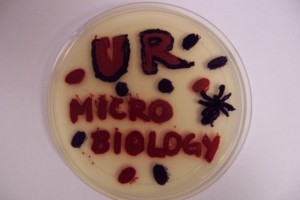Microorganisms (or microbes) are organisms that can not be seen with the naked eye, and are frequently single-celled. They are the most numerous, most diverse and most important organisms on earth. Species of bacteria have been found that can live in temperatures above the boiling point and below the freezing point. As a group, microbes can metabolize almost any compound. They are essential to the biogeochemical cycling of elements on our earth, and yet a single bacterium can kill a human. The mechanisms by which microbes perform all these and many other unique functions are biologically interesting, and their impact on our world is unsurpassed by any other group of organisms. The overall goals of this course include the following:
- To introduce students to the unique aspects of biology of microbes and to the role that these organisms play in our world. A broad range of topics in the field will be presented. These include microbial cell structure & function, microbial growth & nutrition, unique aspects of microbial metabolism, viruses, microbial ecology, and microbial pathogenesis. The contributions of microbes to the world, both positive and negative, will be highlighted through out the course.
- To help students understand the process by which scientific knowledge is acquired. In the laboratory, after a brief introduction to the tools of microbiology, students will use these tools to characterize unknown microbes. They will also either ask and answer their own research questions or explore current open questions in microbiology research.
- To teach students how to read and apply the current scientific literature. Some of the most exciting parts of science involve ongoing research, so students will learn how to read and analyze primary literature related to microbiology.
- To enable students to communicate scientific ideas. The ability to clearly and precisely articulate ideas, both in the written and oral form, is one of the hallmarks of a student trained in the liberal arts. These skills will be further polished in the context of communicating scientific ideas. Students will present lab results in written reports, and you will communicate your understanding of microbiology orally in our class discussions.

